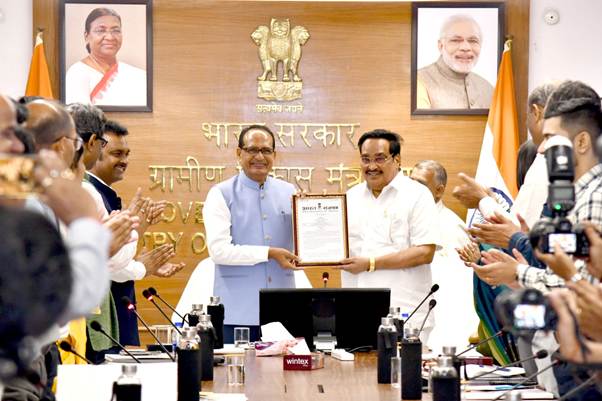Union Minister for Rural Development and Agriculture & Farmers’ Welfare Shivraj Singh Chouhan and Union Jal Shakti Minister Chandrakant Raghunath Patil on Thursday launched the National Initiative on Water Security at Krishi Bhawan, marking a policy shift to prioritize water conservation under the Mahatma Gandhi National Rural Employment Guarantee Act (MGNREGA).
Speaking at the launch event, Chouhan said that under the guidance of Prime Minister Narendra Modi, amendments have been made to the MGNREGA Act to give water-related works the highest priority in water-stressed rural blocks. This move mandates a minimum expenditure on water conservation and harvesting activities, transforming water security into a national mission.
“Water is life. If there is water, there is a tomorrow and a today. Without water, nothing is possible,” Chouhan emphasized.
Under the new guidelines:
* 65% of MGNREGA funds will be allocated to water conservation in ‘over-exploited’ (dark zone) blocks.
* 40% of funds will be earmarked for water-related works in ‘semi-critical’ blocks.
* 30% of funds will go to such activities even in blocks without water scarcity.
Chouhan said this shift will boost groundwater recharge, accelerate rainwater harvesting, and ensure that resources are deployed where they are most needed – moving from a reactive to a preventive approach in rural water management.
Union Jal Shakti Minister C.R. Patil hailed the decision as “a very important and historic step” and noted that it was taken in line with the Prime Minister’s directive to ensure long-term water security.
MGNREGA, the world’s largest social welfare programme, has seen an expenditure of ₹8.4 lakh crore and generated over 3,000 crore person-days of employment since 2014. Women’s participation has risen from 48% in 2014 to 58% in 2025.
More than 1.25 crore water assets such as farm ponds, check dams, and community tanks have been created under MGNREGA, significantly reducing the number of water-stressed rural blocks. Additionally, under the Mission Amrit Sarovar initiative, over 68,000 reservoirs have been built or rejuvenated in its first phase.
Officials from the Rural Development Ministry, district magistrates, and block representatives across the country participated virtually in the launch.














